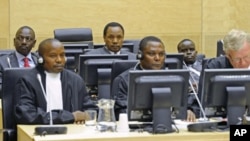Representatives of the International Criminal Court were in Kenya on Monday to seek answers regarding Kenya’s commitment to justice for victims of the 2007-2008 post-election violence.
At the International Criminal Court in The Hague, the case against six Kenyans suspected of planning and financing the country’s post-election violence appears to be faltering. Against his objections, judges ordered Prosecutor Luis Moreno-Ocampo to disclose key evidence and witnesses to the suspects.
The Kenyan government also is questioning the admissibility of the case, pointing to local efforts being put in place to deal with the suspects.
On Sunday, Moreno-Ocampo hit back at the Kenyan government, expressing doubts over Kenya’s commitment to properly investigate the violence.
“On Monday a team from my office will be in Kenya to discuss protection of witnesses with Kenyan authorities," said Moreno-Ocampo. "We will assess not just the protection program for witnesses, but we also want to understand the current position of the government of Kenya in relation to the post-electoral violence.”
In a taped address, the prosecutor accused the government of attempting to sabotage the ICC investigation. Both President Mwai Kibaki and Prime Minister Raila Odinga have in the past expressed commitment to the ICC process, but Ocampo said the government position has shifted since the announcement of the six suspects in December.
Early this year, Kenya attempted to stall the case through diplomatic efforts in both the African Union and the United Nations Security Council. Ocampo highlighted these efforts as evidence of the country's indifference to the victims of the violence.
"Our question to the Kenyan government is: does the government of Kenya want justice for the victims? We need a clear answer, an answer that Kenyans and the world will understand," said Ocampo. "Is the government of Kenya protecting the witnesses or is it protecting the suspects from investigations? That is the question.”
The Kenyan government swiftly denied any allegations of obstruction in the ICC investigation. Government spokesman Dr. Alfred Mutua called Moreno-Ocampo’s charges “wild allegations” and challenged him to present any evidence of wrongdoing to judges at The Hague.
ICC officials are now looking into the suitability of Kenya’s witness protection program. While a witness protection bill was passed in 2010, the program has yet to be funded.
Some 1,300 people were killed, and more than 300,000 displaced, following the 2007 presidential election between President Kibaki and current Prime Minister Odinga. Kibaki's victory set off claims of fraud and sparked two months of ethnic clashes countrywide.
The ICC has named six suspects it believes to have funded and planned the violence, including Finance Minister Uhuru Kenyatta, Former Higher Education Minister William Ruto and head of civil service Francis Muthaura.
ICC Officials In Kenya to Gauge Commitment to Court




